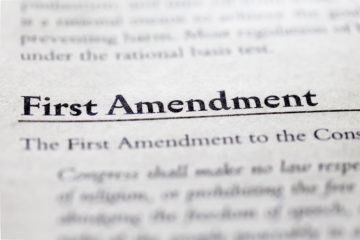In a concerning constitutional twist, the appointment of Julie Su as Acting Secretary of Labor, bypassing Senate confirmation, has ignited debate. The Constitution’s emphasis on checks and balances is at the core of the issue, as the Senate’s role in confirming key executive appointments is being questioned. Beyond procedural matters, Julie Su’s controversial policy stances raise concerns about her fitness for a pivotal role and the potential impact on workers and investors. Market Institute President Charles Sauer has a new article in Real Clear Markets breaking down the repercussions of this unilateral move by the White House.
He writes:
“It’s a story that is repeated in almost every Presidential administration: the President is forced to withdraw a controversial cabinet nominee because of unified opposition from the other party, as well as by some “centrist” members of the President’s own party. So, the President announces that the nomination will not go forward. Instead, this time the rejected nominee will remain as acting Secretary… indefinitely.
You’re probably thinking, what alternative universe is this in? Because in the one I inhabit, a cabinet secretary who fails to obtain a Senate confirmation cannot simply serve in the position as long as their President adds the adjective “acting” to their title. Well, federal law has a loophole allowing the President to get around the Senate confirmation provision in the Constitution, at least in the case of Acting Secretary of Labor Julie Su.
Biden can use this loophole because before her nomination for Secretary, Su was the Labor Department’s Deputy Secretary. Under the Federal Vacancies Reform Act, a Deputy Secretary can serve as acting secretary until a permanent Secretary is appointed, or for 210 days. However, the Department of Labor has a rule allowing an acting Secretary to serve indefinitely. Therefore, Biden thinks he can ignore the Senate and keep Su acting as Secretary for the rest of his term—even though she lacks the votes to be confirmed.
Republicans are discussing challenging the constitutionality of the Labor Department policy and they have a strong case. Anyone who reads the Constitution cannot help but notice that checks and balances between the three branches of government were one of the framers’ central concerns. The thirteen colonies rebelled against England, in part, because they saw their rights being abused by a monarch with absolute power and were determined to prevent a concentration of power in the new nation’s executive. This is why the Constitution not only divides federal power between the executive, legislative, and judicial branches, but gives each branch the power to restrain the other two.
So, while the President oversees the executive branch, which implements federal policies and administers federal laws, Congress writes those laws and appropriates the money required to implement them. Therefore, the executive branch cannot act without the approval of Congress, but Congress cannot itself enforce the laws or policies of the government. Of course, the federal courts are to ensure that the other two branches do not overstep the constitutional limitations on their power, while Congress has the power to limit the jurisdiction of federal courts, and judges must be nominated by the President and confirmed by the Senate.
One of the Constitution’s most significant checks on the President is the requirement that the President’s nominees for cabinet secretaries, ambassadors, federal judges, and other positions receive Senate confirmation before assuming the position. This requirement shows that the drafters understood that personnel is policy. Cabinet secretaries in particular have a great ability to shape the agenda of their agency; at times that ability may be greater than that of the President, who has to divide his time among the entire executive branch.”


